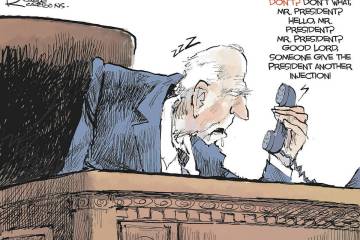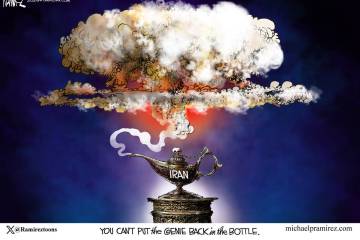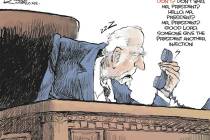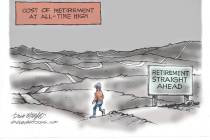COMMENTARY: Metro culture embraces reform: We hear you
Police reform has simmered on the back burner for far too long at some law enforcement agencies throughout the country. Public angst boiled over on May 25. Then came the cries for change in every major city that was in the path of that anger — justified or not.
Just like the story of America, policing has a troubling national history that cannot be denied. Until law enforcement leaders begin to recognize this, reform cannot begin.
That work began here almost a decade ago after the Las Vegas Metropolitan Police Department learned its collective lesson. Following a series of problematic deaths at the hands of police, public pressure increased, and the U.S. Department of Justice threatened to apply its brand of eminent domain on this agency in the form of a consent decree. We looked inward. And so began a new tradition: the continuing search for improvement.
When change took root, it began at the core of this agency. Our insular nature was turned outward as we brought more diverse voices to the table. We sought the counsel of the NAACP and the ACLU. We received help from the DOJ as it brought criminal justice experts to evaluate every part of our agency. The result was the creation of the collaborative reform model that ended with the implementation of 75 recommendations to reduce use-of-force incidents — an effect that led dozens of other agencies to follow suit.
But fast forward to 2020, when protests spilled onto the streets of every city after the death of George Floyd. Members of Metro felt the work this agency had done would surely be taken into account. Yet marchers came on May 29 — and so did their anger. Bottles, bricks and cinder blocks were flung along with words of vitriol toward officers, who received bruises and broken bones from the clashes. One officer will never walk again because of this moment in our history.
The protests were another lesson in this agency’s book. Standing on our front lines were officers who began their careers under reform measures. Many had never known this level of anger from the general public. Most had worked under the new model of community policing meant to bridge the gap between officers and citizens.
As we began to ask protesters what their demands were, many asked that we establish de-escalation training and impose a duty to intervene — two hallmark elements that the Metro adopted in its first year of reform. We realized more work needed to be done to educate the public about the agency.
Throughout its evolution, Metro has also centered its policies around the sanctity of life, emphasizing low- lethal methods of resolving situations, creating a policy to prevent arrestees from having restricted breathing and, most recently, severely limiting the use of a lateral neck restraint. Ethics and fair and just policing methods were incorporated into training. The Citizen’s Use of Force Review Board was created, giving the public a greater voice in the fact-finding process. We created the bureau of Internal Oversight and Constitutional Policing to provide a continual review on all issues surrounding the use of deadly force.
The office also collects vital statistics that serve as our report card to the community. The most recent five-year report showed a 27 percent decrease in officer-involved shootings last year. It also showed us that suspects were armed in 97 percent of the incidents over five years.
A new chapter to the book of police reform in Nevada will likely be written during the special legislative session that began Friday. As a teaching agency, Metro hopes to lead the push for national data collection on law enforcement, making it mandatory to report. We are willing to meet the challenge to improve data collection in other areas concerning police contact with citizens to give us all a better picture of policing practices. And we support adding more layers of accountability and independent review. We support making annual de-escalation training and the duty to intervene mandatory for all state agencies.
Metro has created a culture that has welcomed change and the diversity of ideas. This legislative session promises to allow us the ability to leverage our experience in reform to shape the conversation toward the betterment of all agencies in the state. It will give us a constructive forum to hear from citizens about how they would like to be policed and provide input on how we can move the bar for reform even higher.
In the end, we have all learned that it comes down to the three most powerful words that any public agency can tell its community: We hear you.
Joe Lombardo is the Clark County sheriff.




























